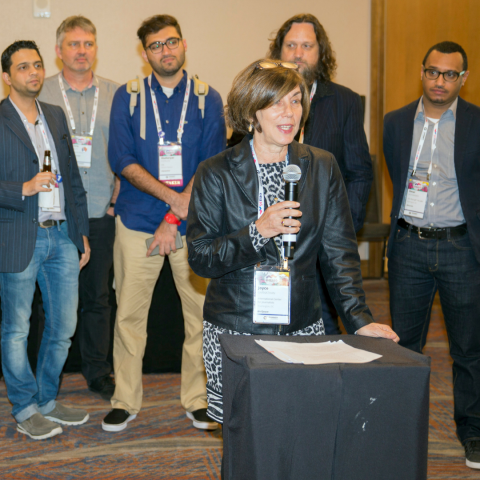
ICFJ President Joyce Barnathan introduces ICFJ Knight Fellows during a reception at ONA. Photo by Steven Strasser.
A group of journalism pioneers, working as Knight International Journalism Fellows, highlighted a range of digital innovations before an audience of U.S. newsroom leaders at the 2016 Online News Association (ONA) conference in Denver, Colorado. The Fellowships are run by the International Center for Journalists (ICFJ), and they are designed to spur a global culture of news innovation.
At the conference, ICFJ Knight Fellows engaged in a range of activities, from participating on panels to speaking at lightning sessions where they spotlighted tools, services and ideas that could be embraced by U.S. newsrooms. ICFJ Vice President Patrick Butler moderated a panel discussion on the Panama Papers that featured Knight Fellow Justin Arenstein. And at a special reception, ICFJ President Joyce Barnathan introduced nine Fellows and their cutting-edge projects.
“In this fast-changing, tech-driven world of news media, you need catalysts, experts who drive media innovation,” she said. “Enter our Knight Fellows. We want to share their expertise with you, their U.S. counterparts.” The Knight Fellowships are funded by the John S. and James L. Knight Foundation and the Bill & Melinda Gates Foundation.
ICFJ Knight Fellow Chris Roper, for example, appeared on an ONA panel on new revenue sources for journalism. At the Steal My Tool gathering, an event co-hosted by ICFJ and Vox Media, Roper showcased Briefcase, a tool built upon a version of DocumentCloud, which allows investigative reporters to upload, store and search a massive number of documents. Briefcase lets users host these searchable documents on their own website, fitting seamlessly into their online branding and design. The code is open source and available to download on GitHub.
Pakistani Fellow Shaheryar Popalzai, an expert in 360° video coverage, has developed an easy-to follow explainer infographic on how to embrace this technology without spending huge sums of money. Popalzai has helped Pakistan’s Express Tribune tell arresting stories on the country’s largest slums and decayed heritage sites using 360° video. He also worked on an Express Tribune story about the victims of the 2014 Peshawar school massacre, which was nominated for an ONA Online Journalism Award.
In India, Nasr ul Hadi helped major news organizations such as the the Hindustan Times change its newsroom culture to be more innovative. Hadi instituted peer-to-peer training sessions, known as Digital Fridays. These hands-on, two-hour workshops increased collaboration between newsroom staff who otherwise would have never crossed paths. “I’ve seen a managing editor sit next to an intern” as they worked together to find interesting ways to analyze and visualize data, he said.
Over time, Digital Fridays led to teams who continue to work on news innovations, and some have become workshop trainers themselves, Hadi said. Free templates for how to lead Digital Friday trainings are available here.
At the ICFJ reception, ICFJ Knight Fellow Justin Arenstein spoke about new tools to collect data for investigative stories and emphasized their utility for resource-strapped newsrooms. He helped develop ANCIR, the African Network of Centers for Investigative Reporting, which broke many stories in the Panama Papers project.
For more information on the ICFJ Knight Fellows’ tools and strategies revealed at the 2016 ONA conference, click here.
Photos by Steven Strasser.